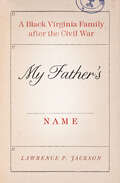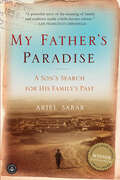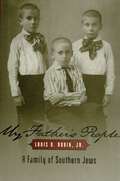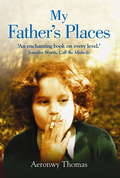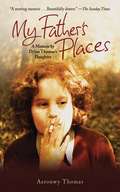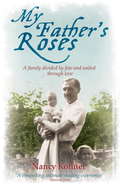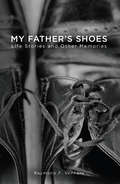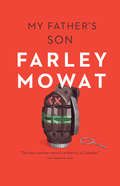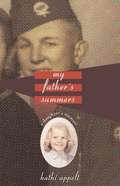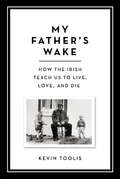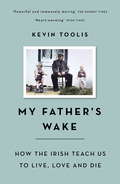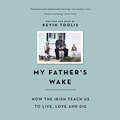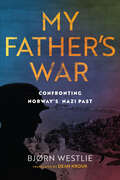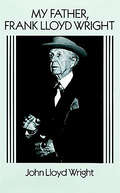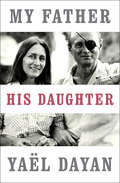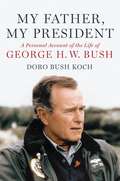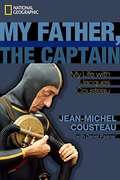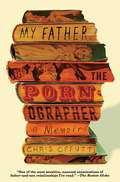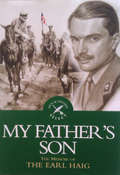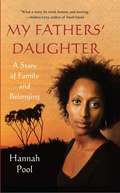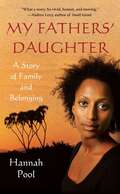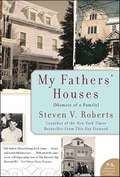- Table View
- List View
My Father's Name: A Black Virginia Family after the Civil War
by Lawrence P. JacksonAn African American studies scholar traces his family lineage to a Black Virginia neighborhood in the era of Reconstruction in this historical memoir. As an expectant father, Lawrence P. Jackson decides to go looking for his late grandfather&’s home in Pittsylvania County, Virginia, an old house by the railroad tracks in Blairs. Armed with nothing but childhood memories, his journey evolves into a kind of detective story as he uncovers his ancestral history through the turmoil and torment of the 19th century South. After asking around in Pittsylvania County, Jackson finds himself in the house of distant relations. He becomes increasingly absorbed by the search for his ancestors and soon realizes how few generations an African American needs to map in order to arrive at slavery, the &“door of no return.&” Ultimately, Jackson&’s dogged research leads him to his grandfather&’s grandfather, a man who was born or sold into slavery but who, when Federal troops abandoned the South in 1877, was able to buy forty acres of land. In this intimate study of a black Virginia family and neighborhood, Jackson vividly reconstructs moments in the lives of his father&’s grandfather, Edward Jackson, and great-grandfather, Granville Hundley, and gives life to revealing narratives of Pittsylvania County, recalling both the horror of slavery and the later struggles of postbellum freedom.
My Father's Paradise: A Son's Search for His Family's Past
by Ariel SabarIn a remote corner of the world, forgotten for nearly three thousand years, lived an enclave of Kurdish Jews so isolated that they still spoke Aramaic, the language of Jesus. Mostly illiterate, they were self-made mystics and gifted storytellers and humble peddlers who dwelt in harmony with their Muslim and Christian neighbors in the mountains of northern Iraq. To these descendants of the Lost Tribes of Israel, Yona Sabar was born. Yona's son Ariel grew up in Los Angeles, where Yona had become an esteemed professor, dedicating his career to preserving his people’s traditions. Ariel wanted nothing to do with his father’s strange immigrant heritage—until he had a son of his own. Ariel Sabar brings to life the ancient town of Zakho, discovering his family’s place in the sweeping saga of Middle-Eastern history. This powerful book is an improbable story of tolerance and hope set in what today is the very center of the world’s attention.
My Father's People: A Family of Southern Jews
by Louis D. Jr.Louis Rubin's people on his father's side were odd, inscrutable, and remarkable. In contrast to his mother's family, who were "normal, good people devoid of mystery," the ways of the Rubins both puzzled and attracted him. In My Father's People, Rubin tells "as best I can about them all -- my father, his three brothers, and his three sisters." It is a searching, sensitive story of Americanization, assimilation, and the displacement -- and survival -- of a religious heritage.Born between 1888 and 1902 in Charleston, South Carolina, their father an immigrant Russian Jew, the Rubin children suffered dire poverty, humiliation, and separation when their parents became incapacitated. Three of the boys were sent to the Hebrew Orphans' Home in Atlanta for several years. Yet the sons all managed to build long, productive, even notable lives and livelihoods, becoming, variously, a newspaper editor, Broadway playwright and Hollywood screenwriter, businessman, and -- in the case of Rubin's father -- a far-famed long-range weather prognosticator.Private people, reticent to discuss their painful early years, the Rubins were not easily knowable. Still, the author draws a strikingly candid portrait of each, using memories, stories, keen insight, and broad empathy -- fascinating character studies full of individual propensities and peculiarities that together reveal the wider family resemblance. Although the Rubins were mostly nonreligious as adults, their family's rabbinical tradition and their experience as southern Jews were key to their vocational fervor and the lives they made for themselves. "They were Americans, and they were Jews," Rubin concludes. "These were enough."Told with Louis Rubin's signature eloquence and wit, My Father's People is a testimony to the courage of immigrant southern Jews and their gifts to their chosen country.
My Father's Places
by Aeronwy ThomasIn 1949, after years of nomadic existence, nine-year-old Aeronwy Thomas and her family arrived at the Boat House in Laugharne, a small village on the Welsh coast. Here her father, the poet Dylan Thomas and mother, Caitlin, hoped to find peace, a place to settle and work.In Laugharne Dylan began some of his most famous works, including Under Milk Wood. Mornings were spent in Brown's Hotel, listening to the gossip at Ivy William's kitchen table. In the afternoons Caitlin would lock the poet into a shed in the garden, where he sat speaking his verse aloud as he wrote, or composed begging letters to patrons and friends. Often he would head off to London, and old haunts. Little Aeronwy enjoyed the new world around her. In the Boat House, ruled over by Caitlin, there was baby Colm and in the holidays visits from big brother Llewellyn, as well as Dolly, the cleaner and cook, and the house became a refuge for village characters, including Booda the deaf, mute ferry man. The memoir paints scenes of sudden drama and poetry: reading Wind in the Willows with her father in the evenings; fish treading in the mud below the house with her mother; afternoons with Grandma Flo and DJ at the Pelican. Dylan's fame grows and he tours the United States to read his poetry. Aeronwy watches as the marriage fractures, and at last the poet dies in New York, far away from his children. My Father's Places is a deeply moving portrait of growing up and an insight into the origins and the legacy of Dylan Thomas's poetry.
My Father's Places: A Memoir By Dylan Thomas's Daughter
by Aeronwy ThomasIn 1949, after years of nomadic existence, nine-year-old Aeronwy Thomas and her family arrived at the Boat House in Laugharne, a small village on the Welsh coast. Here her father, the poet Dylan Thomas and mother, Caitlin, hoped to find peace, a place to settle and work.In Laugharne Dylan began some of his most famous works, including Under Milk Wood. Mornings were spent in Brown's Hotel, listening to the gossip at Ivy William's kitchen table. In the afternoons Caitlin would lock the poet into a shed in the garden, where he sat speaking his verse aloud as he wrote, or composed begging letters to patrons and friends. Often he would head off to London, and old haunts. Little Aeronwy enjoyed the new world around her. In the Boat House, ruled over by Caitlin, there was baby Colm and in the holidays visits from big brother Llewellyn, as well as Dolly, the cleaner and cook, and the house became a refuge for village characters, including Booda the deaf, mute ferry man. The memoir paints scenes of sudden drama and poetry: reading Wind in the Willows with her father in the evenings; fish treading in the mud below the house with her mother; afternoons with Grandma Flo and DJ at the Pelican. Dylan's fame grows and he tours the United States to read his poetry. Aeronwy watches as the marriage fractures, and at last the poet dies in New York, far away from his children. My Father's Places is a deeply moving portrait of growing up and an insight into the origins and the legacy of Dylan Thomas's poetry.
My Father's Places: A Memoir by Dylan Thomas's Daughter
by Aeronwy ThomasWhen Aeronwy was six, her parents Dylan and Caitlin Thomas moved to the boathouse at the edge of the small Welsh village Laugharne. Through a child's eye, she recalls the chaos and joy of living with Dylan Thomas while the poet was at the height of his creative powers, composing Under Milk Wood. Through a series of beautifully evocative episodes, village and family life are explored. Emerging from the narrative, Aeronwy tells a moving memoir of growing up in Wales in the 1940s and a new portrait of Dylan Thomas as a father from the only person who could tell that story. This literary sensation includes never-before-seen photos of Dylan Thomas and his family, will get widespread attention, and features personalities like Augustus John, A.J.P. Taylor, as well as the villagers who would eventually be transformed into the characters from Llareggub.
My Father's Roses
by Nancy KohnerSome families save and others throw away. The Kohners, a Jewish family living in Bohemia at the end of the nineteenth century, threw very little away. A hundred years later their casually assembled archive of over a thousand family letters, hundreds of photos, diaries and notebooks, pieces of verse, invoices, tickets and programmes, tells a unique story. Like most families, they are as concerned with their own affairs as with world events. Two parents, Heinrich and Valerie and their three children, Franz, Berta and Rudi, write to each other about what matters to them most - a compelling story of love and rivalry, arguments and reconciliations, business, money-making and home. As history overtakes them, their ordinary lives collide with extraordinary world events. In 1939, Hitler's invasion destroys the world in which they have lived and loved. Decades later, Rudi's daughter, Nancy Kohner, goes through the archive of letters and diaries and began to reflect on what it means to inherit such a story - words from a lost world. Captivated, amused and often surprised by what she uncovered, in My Father's Roses she revisited, with extraordinarily moving tenderness, her relationship with her father and, through him, a family she never knew.
My Father's Roses
by Nancy KohnerSome families save and others throw away. The Kohners, a Jewish family living in Bohemia at the end of the nineteenth century, threw very little away. A hundred years later their casually assembled archive of over a thousand family letters, hundreds of photos, diaries and notebooks, pieces of verse, invoices, tickets and programmes, tells a unique story. Like most families, they are as concerned with their own affairs as with world events. Two parents, Heinrich and Valerie and their three children, Franz, Berta and Rudi, write to each other about what matters to them most - a compelling story of love and rivalry, arguments and reconciliations, business, money-making and home. As history overtakes them, their ordinary lives collide with extraordinary world events. In 1939, Hitler's invasion destroys the world in which they have lived and loved. Decades later, Rudi's daughter, Nancy Kohner, goes through the archive of letters and diaries and began to reflect on what it means to inherit such a story - words from a lost world. Captivated, amused and often surprised by what she uncovered, in My Father's Roses she revisited, with extraordinarily moving tenderness, her relationship with her father and, through him, a family she never knew.
My Father's Shoes
by Raymond F. VennareMy Father's Shoes is, at its core, an anthology of short stories. The book is allegoric and the shoes are metaphoric. Unlike most anthologies, however, these stories are an amalgam of themselves. They integrate and coalesce. There is a rhythm and a cadence both in substance and in form.This book was initially written as a gift to my father. I wanted to share certain memories with him that were meaningful and lasting. I wanted him to know, from my perspective, just how important he was in my life. He never really understood the profound impact that he had on the lives of other people -especially his family. Because of that humility, or perhaps in honor of it, I wanted to him know that he truly made a difference in this world.As others read the manuscript they seemed to recognize something of themselves in these stories. A memory. A passage. An incident. A feeling. As they did I became more comfortable with sharing these vignettes of family life.In the end this book is really more about me than my father. But, even more than that, it is about appreciating every circumstance in life however mundane or unremarkable it may seem at the time. These seemingly discrete and unrelated moments actually define who you are, what you become and what matters most in life. At least they did for me.My father always used to say, senza memoria vita non esiste, which in Italian means, 'without memory life does not exist.' These are my memories and this is my inheritance.Raymond F. VennareWhile dedicating a significant and successful portion of his life and career to business, entrepreneurship and science, Raymond's essential orientation is humanistic. He is exquisitely aware of the inter-relatedness of all things.This ability to intrinsically see and understand how disciplines overlap and coincide is Raymond's distinctive gift. He is at home in the intersections of business, culture, art and science, and uses interconnectedness as a catalyst for finding novel ways to forge bonds across disciplines and solve human problems.Raymond has always been driven to express his way of seeing the commonalities of the world. This is reflected in the lifelong diversity and range of his pursuits; through his work as an academically trained art historian, ethicist and businessman and as a multi-disciplinary artist -- painter, writer, musician, and commentator.His current artistic offering is a richly textured memoir, My Father's Shoes, which he is also adapting for stage and audio performance. This vibrant anthology celebrates the capacity of one person to make a lasting difference in the lives of others.With humorous reflection, clanking dishes, wafting aromas, and loving tenderness, it vividly reminds us how we ultimately transfer our human energy trough the stories and memories we create and leave behind.There isn't one ounce of fat in Vennare's writing. Every story is a journey, every sentence a complete thought. This book is not just a good read ... this is Benediction.--Frank Ferraro, Filmmaker and PlaywrightI feel like I know these people, and I care about them and the vivid way they lived. Vennare's courage in the act of remembering his father's life, and revealing his own, is an invitation to all of us to find a way to pass on the stories and memories we hold most dear.--Karen Kern, WriterMy Father's Shoes is a wonderful trip down memory lane. With each chapter read, the pages penned touched my heart and resonated with personal stories of my own family members. The book is a one shoe fits all narrative.--Lillie Leonardi, Author, In the Shadow of a Badge
My Father's Son
by Farley MowatThe follow-up to And No Birds Sang, Farley Mowat's memoir My Father's Son charts the course of a family relationship in the midst of extreme trial. Taking place during Mowat's years in the Italian Campaign, the memoir is mostly told through original letters between Mowat and his mother, Helen, and his father, Angus, a World War I veteran and librarian. Written between 1943 and 1945, the correspondence depicts the coming of age of a young writer in the midst of war, and presents a sensitive and thoughtful reflection of the chaos and occasional comedy of wartime.First published in 1992, Douglas & McIntyre is pleased to add My Father's Son to the Farley Mowat Library series, which includes the other recently re-released titles Sea of Slaughter, People of the Deer, A Whale for the Killing, And No Birds Sang, Born Naked and The Snow Walker.
My Father's Summers: A Daughter’s Memoir
by Kathi AppeltA series of prose poems describes the author's life while she was growing up in Houston, Texas, from her eleventh birthday in 1965 through her eighteenth in 1972, and beyond.
My Father's Wake: How The Irish Teach Us To Live, Love, And Die
by Kevin ToolisAn intimate, lyrical look at the ancient rite of the Irish wake--and the Irish way of overcoming our fear of deathDeath is a whisper for most of us. Instinctively we feel we should dim the lights, pull the curtains, and speak softly. But on a remote island off the coast of Ireland's County Mayo, death has a louder voice.Each day, along with reports of incoming Atlantic storms, the local radio runs a daily roll call of the recently departed. The islanders go in great numbers, young and old alike, to be with their dead. They keep vigil with the corpse and the bereaved company through the long hours of the night. They dig the grave with their own hands and carry the coffin on their own shoulders. The islanders cherish the dead--and amid the sorrow, they celebrate life, too.In My Father's Wake, acclaimed author and award-winning filmmaker Kevin Toolis unforgettably describes his own father's wake and explores the wider history and significance of this ancient and eternal Irish ritual. Perhaps we, too, can all find a better way to deal with our mortality--by living and loving as the Irish do.
My Father's Wake: How the Irish Teach Us to Live, Love and Die
by Kevin ToolisDeath is a whisper in the Anglo-Saxon world. But on a remote island, off the coast of County Mayo, it has a louder voice. The local radio station runs a thrice-daily roll-call of the recently departed. The islanders keep vigil with the corpse and share in the sorrow of the bereaved. The living and the dead are bound together in the oldest rite of humanity. In My Father's Wake, Kevin Toolis gives an intimate, eye-witness account of the death and wake of his father, celebrating the spiritual depth of the Irish Wake and asking if we too can find a better way to deal with our mortality, by living and loving in the acceptance of death.
My Father's Wake: How the Irish Teach Us to Live, Love and Die
by Kevin ToolisDeath is a whisper in the Anglo-Saxon world. But on a remote island, off the coast of Co. Mayo, it has a louder voice. Along with reports of incoming Atlantic storms, the local radio station runs a thrice daily roll call of ordinary deaths. The islanders go in great numbers, often with young children, to wake with their dead. They keep the corpse and the bereaved company through the long hours of the night. They dig the grave with their own hands. It is a communal triumph in overcoming the death of the individual. In this beautifully written memoir, Kevin Toolis gives an intimate, eye-witness account of the death and wake of his father, and explores the wider history of the Irish Wake. With an uplifting, positive message at its heart, My Father's Wake celebrates the spiritual depth of the Irish Wake and asks if we can find a better way to deal with our mortality, by living and loving in the acceptance of death.Written and Read by Kevin Toolis(p) 2017 Orion Publishing Group
My Father's War: A True Story of Nazism and Treason
by Bjørn WestlieMy Father’s War is simultaneously a history of the Nazi occupation of Norway in World War II and a son’s sincere attempt to understand the silences, motivations, and experiences of an estranged father. In this carefully researched book, combining family memoir and historical retelling, Bjørn Westlie uncovers his father’s actions as a volunteer soldier for the Waffen-SS, the military wing of the infamous Schutzstaffel (SS), in the invasion of the Soviet Union. Balancing his role as both son and critical investigator, Westlie unflinchingly interrogates his father’s fascist convictions, which speak to the appeal Hitler’s ideology held for a small, disgraced segment of Norway’s mid-century population. A story of collaboration, tragedy, and treason, My Father’s War reveals the little-known history of Norway's frontkjempere (front fighters), the atrocities the Waffen-SS committed against Ukrainian Jews, and the complex legacies of ethnonationalism in Norway. With an insightful introduction from translator Dean Krouk, My Father’s War is a contemporary classic of war literature. Committed to genuine understanding without falling into undue sympathizing, this sober and reflective book presents an eye-opening, moving, intense, and necessary account of the allure of fascism in a world at war—and its personal costs.
My Father, Frank Lloyd Wright
by John Lloyd Wright"An anecdotal reminiscence of America's chief living genius by his son -- short, unconventional, amusing and on the whole revealing." -- Book Week.Frank Lloyd Wright is widely regarded as the twentieth century's greatest architect -- an unconventional genius who transformed both residential and commercial building design with his concept of "organic" architecture. During a long and productive life, Wright designed some 800 buildings, received scores of honors and awards, and left an indelible imprint on modern architectural theory and practice.In this charming, readable memoir, Wright the architect and father comes to life through the vivid recollections and firsthand knowledge of his son. John Lloyd Wright characterizes his father as "a rebel, a jolt to civilization, whose romantic theme -- purposive planning and organic unity in inventing and combining forms -- is an epoch in the architecture of the world." His unique view of the "epoch" will intrigue architects, students, and all who admire the work of this visionary and uncompromising spirit. An added attraction of this volume is the inclusion of the complete text of William C. Gannet's The House Beautiful, an extremely rare work designed and printed by Frank Lloyd Wright.
My Father, His Daughter
by Yaël DayanA life of one of Israel's greatest heroes, as seen through his daughter's eyes Moshe Dayan was one of the greatest military leaders in Israel's short history. A child of the first kibbutz movement in British Palestine, he went on to lead Israel to victory in the 1948 War of Independence and to liberate Jerusalem in the 1967 Six-Day War. Dayan was not only a soldier but a politician, an archaeologist, and a larger-than-life figure who helped shape the state of Israel. In My Father, His Daughter, Yaël Dayan, who herself served in the Israeli Parliament, shares an uncensored look into her father's life and her own conflicted relationship with him. With poignancy and candor, Dayan creates a profound yet nuanced profile of her father. She relates his strong national pride, his boldness in dealing with other world leaders, and his troubles at home to his disintegrating marriage and multiple affairs. As revealing as My Father, His Daughter is of the man behind the myth, it is also a snapshot of a loving relationship between Yaël and Moshe Dayan, and of a daughter's admiration and respect for a complicated but loving father.
My Father, My President: A Personal Account of the Life of George H. W. Bush
by Doro Bush KochWhen George H. W. Bush asked Doro to write this memoir, she contacted hundreds of his friends and associates; conducted scores of interviews with dignitaries including Bill Clinton, Mikhail Gorbachev, and General Colin Powell; tapped the memories of family members, including her mother, her four brothers, and of course, her father himself; and collected information from the former president's never-before-released files. "Now for the first time, a complete portrait of George H. W. Bush emerges. Doro reveals her father as a young man courting his future wife, Barbara, and how the death of their first daughter brought them closer. Doro tells how they raised five children through much of her father's long and storied career in public service, and offers details about this tenures as head of the Republication National Committee during Watergate, ambassador to the U.N., America's liaison to China, and vice president for eight years under Ronald Reagan." "Doro also provides an insider's look at how the 41st president dealt with crises and challenges, all while keeping his humor and personality intact, and how he still does so while aiding victims of the 2004 tsunami and Hurricane Katrina. She shows how he felt when two of his sons entered politics - and when his eldest made it to the top - and sheds new light on his friendship with former rival Bill Clinton."--BOOK JACKET.
My Father, My President: A Personal Account of the Life of George H. W. Bush
by Doro Bush KochWhen George H. W. Bush asked Doro to write this memoir, she contacted hundreds of his friends and associates; conducted scores of interviews with dignitaries including Bill Clinton, Mikhail Gorbachev, and General Colin Powell; tapped the memories of family members, including her mother, her four brothers, and of course, her father himself; and collected information from the former president's never-before-released files. "Now for the first time, a complete portrait of George H. W. Bush emerges. Doro reveals her father as a young man courting his future wife, Barbara, and how the death of their first daughter brought them closer. Doro tells how they raised five children through much of her father's long and storied career in public service, and offers details about this tenures as head of the Republication National Committee during Watergate, ambassador to the U.N., America's liaison to China, and vice president for eight years under Ronald Reagan." "Doro also provides an insider's look at how the 41st president dealt with crises and challenges, all while keeping his humor and personality intact, and how he still does so while aiding victims of the 2004 tsunami and Hurricane Katrina. She shows how he felt when two of his sons entered politics - and when his eldest made it to the top - and sheds new light on his friendship with former rival Bill Clinton."--BOOK JACKET.
My Father, the Captain
by Daniel Paisner Jean-Michel CousteauSuch a gift he has given to me! Such an inheritance! . . . I notice an unusual opening in the kelp. All around there is this dense and marvelous kelp forest, which appears to collect around a silky, sandy bottom. The way it appears before me, at just that moment, is almost otherworldly. The sun's rays are shining brightly through the kelp, lighting up this little, inexplicable patch of sand-like a spotlight on an empty stage. All around me there are tiny garibaldi, brightly colored damselfish native to the area. In normal light, they're a fantastic, shimmering orange, but here, in this bright sunlight, they are like festive candles, a string of party decorations announcing some underwater fiesta.
My Father, the Pornographer
by Chris OffuttAfter inheriting 400 novels of pornography written by his father in the 1970s and '80s, critically acclaimed author Chris Offutt sets out to make sense of a complicated father-son relationship in this carefully observed, beautifully written memoir."Chris Offutt owns one of the finest, surest prose styles around, ready and able to convey the hardest truth without flinching. Now Offutt enters the darkest and most mysterious of places--the cave of a monstrous enigma named Andrew J. Offutt--armed with nothing but his own restless curiosity. Spoiler alert: He makes it out alive, walking into the daylight to bring us a deeper, funnier, more tender and more heartbroken truth--and his masterpiece." --Michael Chabon When Andrew Offutt died, his son, Chris, inherited a desk, a rifle, and eighteen hundred pounds of pornographic fiction. Andrew had been considered the "king of twentieth-century smut," with a writing career that began as a strategy to pay for his son's orthodontic needs and soon took on a life of its own, peaking during the 1970s when the commercial popularity of the erotic novel reached its height. With his dutiful wife serving as typist, Andrew wrote from their home in the Kentucky hills, locked away in an office no one dared intrude upon. In this fashion he wrote more than four hundred novels, including pirate porn, ghost porn, zombie porn, and secret agent porn. The more he wrote, the more intense his ambition became and the more difficult it was for his children to be part of his world. Over the long summer of 2013, Chris returned to his hometown to help his widowed mother move out of his childhood home. As he began to examine his father's manuscripts and memorabilia, journals, and letters, he realized he finally had an opportunity to gain insight into the difficult, mercurial, sometimes cruel man he'd loved and feared in equal measure. Only in his father's absence could he truly make sense of the man and his legacy. In My Father, the Pornographer, Offutt takes us on the journey with him, reading his father's prodigious literary output as both a critic and as a son seeking answers. This is a book about the life of a working writer who supports his family solely by the output of his typewriter; it's about the awful psychic burdens one generation unthinkingly passes along to the next; and it's about growing up in the Appalachian hills with a pack of fearless boys riding bicycles through the woods, happy and free.
My Fathers Son
by Dawyck HaigDawyck Haig, the only son of the great Field Marshal, was born in 1918, the year of his father's victory. His life has been hugely influenced by the legendary status accorded to his father and, after 1932, to himself. This unique memoir reveals a side of the Field Marshal that has never been seen before and makes mandatory reading for those who seek to understand one of the foremost military figures of the age. The author goes on to tell of his own experiences as a soldier in The Royal Scots Greys in World War Two, of his capture and imprisonment in Colditz. Designated a Prominente, he and other sons of well known men were singled out as potential hostages on the orders of Hitler and, as a result, lived under continuous threat of execution. This important memoir is sensitively written. It is heavily illustrated with photographs of Field Marshal Haig that have never been seen before. A fascinating and compelling book.
My Fathers' Daughter: A Story of Family and Belonging
by Hannah PoolWhat do you wear to meet your father for the first time? In 2004, Hannah Pool knew more about next season's lipstick colors than she did about Africa: a beauty editor for The Guardian newspaper, she juggled lattes and cocktails, handbags and hangouts through her twenties just like any other beautiful, independent Londoner. Her white, English adoptive relatives were beloved to her and were all the family she needed. Okay, if I treat it as a first date, then I'm on home turf. What image do I want to put across?...Classic, rather than trendy, and if my G-string doesn't pop out, I should be able to carry the whole thing off. Contacted by relatives she didn't know she had, she decided to visit Eritrea, the war-torn African country of her birth, and answer for herself the daunting questions every adopted child asks. Imagine what it's like to never have seen another woman or man from your own family. To spend your life looking for clues in the faces of strangers...We all need to know why we were given up. What Hannah Pool learned on her journey forms a narrative of insight, wisdom, wit, and warmth beyond all expectations. When I stepped off the plane in Asmara, I had no idea what lay ahead, or how those events would change me, and if I'd thought about it too hard I probably wouldn't have gotten farther than the baggage claim. A story that will "send shivers down [your] spine," (The Bookseller), My Fathers' Daughter follows Hannah Pool's brave and heartbreaking return to Africa to meet the family she lost -- and the father she thought was dead.
My Fathers' Daughter: A Story of Family and Belonging
by Hannah PoolHannah Pool, a feature writer at The Guardian newspaper in London was born in the small African country of Eritrea in 1974 but her family, being unable to care for her, gave her to a white British couple for adoption shortly after her birth. This book describes her search for and visit to her birth family and her feelings before and after meeting them.
My Fathers' Houses: Memoir of a Family
by Steven V. RobertsFrom Steven V. Roberts comes My Fathers' Houses, a memoir of growing up in Bayonne, New Jersey, an immigrant community in the shadow of the Statue if Liberty, and the story of how his father and his grandfather's dreams–and their own passion for writing and ideas–influenced Steven's future, and inspired him to seek his fortune in New York City, the media capital of the world. This is a story of a town and a time and a boy who grew up there, a boy who became a New York Times correspondent, TV and radio personality, and best–selling author. The town was Bayonne, New Jersey, a European village so close to New York that Steve could see the Statue of Liberty from his bedroom window. The time was the forties and fifties, when children of immigrants were striving to become American and find a place in a booming post–war world. The core of Steve's world was one block, where he lived in a house his grandfather, Harry Schanbam, had built with his own hands. But the story starts back in Russia, where the family business of writing and ideas began. Steve's other grandfather, Abraham Rogowsky, stole money to become a Zionist pioneer in Palestine before moving to America. The tale continues through the Depression, when Steve's parents lived one block apart in Bayonne, wrote letters to each other and married in secret. During the war years, Steve's father wrote children's books and based one of his best sellers on outings he took with his twin sons to the local train station. As his byline, he used his boys' middle names–Jeffrey Victor–so Steve got his first writing credit before he was two. The story concludes with the boy leaving Bayonne, going on to Harvard, meeting the Catholic girl who became his wife, and starting work at the New York Times–across the river, and worlds away, from where he began. Now a grandfather of five, Steve Roberts looks in the mirror and sees his own father and grandfather looking back at him–a family chain that started in 19th century Russia and thrives today in 21st century America.
